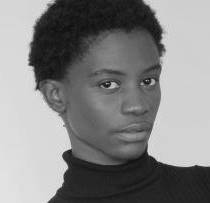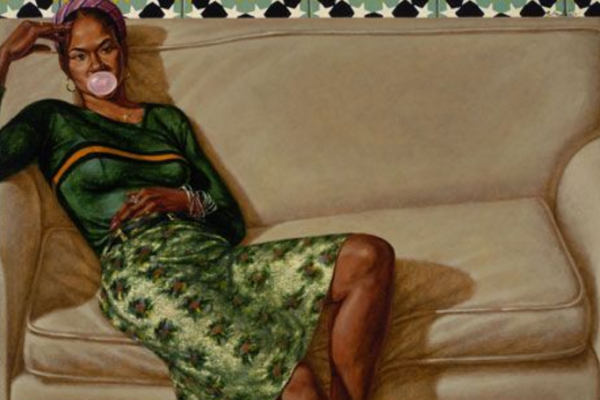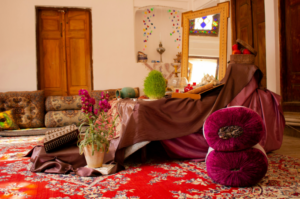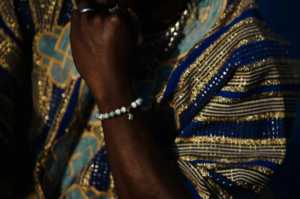Everything was broken. The coffee table which doubled as a dresser and the cream clock radio with its wires sticking out clumsily at the socket perched on top of it.
The windows that had been patched up with cardboard were now bare, and the door with no door knob hung from its hinge. Everything that had been broken was broken once more.
Uchi ironed the pink sheet with her palm, lingering at the foot of the broken bed as though she had found some secret treasure. When she was younger her mother had kept a bundle of notes there—away from her father and the prying hands of in-and out relatives.
She did not need them now. She had more than enough—but still she hoped to find them, perhaps more than anything to find after all that she had lost.
“Ba Madam.”
Uchi quickly straightened her posture and rubbed her eyes.
“Yes?” she croaked.
“There are visitors”, said Maria, retreating behind the door, her wide eyes filled with embarrassment.
Uchi tightens the knot of her wrapper and slips into the court heels next to the bed, the soles still caked in mud from the walk to the top of that sullen hill.
In the musty lounge she finds a taut woman staring decidedly at the blackened television screen. The woman uncrosses her ankles and frees her fingers from their prayerful entanglement before she rises officially, as if preparing to sing a hymn. Uchi purses her lips and wrestles her cheeky grin at the woman’s Churchliness.
“Condolences”, the woman mutters, her body sinking into itself and her face turning downwards. “Condolences”, she says again—this time in a loud, shaky whisper.
Uchi looks past the woman’s face to a peeling patch of paint on the browning wall. She clasps her hands and bows a leg before fumbling into the arm chair. The stranger lets out a sheepish smile and tilts her head slightly. A torrent of uneasy laughter and “ah’s!” fill the room.
“It’s been long!” exclaims Uchi, forgetting her moment of grief. She mimics the woman’s churchliness, crossing her ankles and placing her hands delicately one on top of the other. Her body is unwilling or perhaps unable to move on its own.
“Yes it’s been long but I thought—”, the woman echoes.
“No—I heard last week, but I only arrived last night, so but, I thought I would just pass by—”, she continues humbly. Her voice is musical, rising and falling, and quietening unexpectedly. Uchi listens intently and savors the lingering silence between them before her thank you. Maria glides into the room with a tray of glasses, Fanta deposits and a glistening jug of water. She sets them down on the scratchy, square wooden table next to the arm chair before hurrying out of the room, embarrassed, once again, at the moment’s nakedness. Maria seemed to see all and Uchi wonders what it is Maria has seen which she has not.
When she leaves, the room is stifled with old air, the same air her and the woman had breathed when they last saw each other— five years ago at some obscure connecting-flight airport. How strange it felt to Uchi that they had barely waved at each other in that crumbling airport—the only two foreigners in a strange place—and yet here they were drinking Fanta and sharing condolences.
Uchi gets up to close the windows, murmurs of early evening disturbing the room-music from drinking holes, singing from the new pentacostal churches, and squealing from the back of yards where children are splashed with luke warm water and grazed with soapy stones.
“Ah, quiet.” Uchi says letting out a sigh. “You know how it is when everyone is in and, out—so it’s nice to have some quiet”, she continues.
The woman nods politely. “You’re not married, you don’t have children?” she asks abruptly, sipping from the orange glass.
Uchi furrows her eyebrows, offended by the casualness with which she demanded to know. She had expected some small talk—something about how much hotter it gets every year during dust season, about the long flights they had both taken into town, about how much better the roads were, and the New Mall in the city centre, and the New Mall’s name which had caused a stir. She had known her friend to be direct but after all these years apart had not expected it, had not expected anything.
“No, no children. Not married. Not engaged. Not anything”, she replies reluctantly.
“Joseph and I are separated now. That’s why I had to come back. School for the girl”, she says. “But nothing is decided yet.” she adds hastily.
“I’m sorry”, replies Uchi. But she was not sorry. How could she be sorry with the long slender face and its unrelenting curves and sharp turns seeming to draw closer to her. How could she be sorry for the woman whose easiness and quiet charm had always come so… easily? How could she be sorry for the winning woman who had found everything and lost nothing ? She was beautiful. To be sure, Uchi was overcome by a great beauty, but it was one that could easily be memorised and forgotten. She, was beautiful in a way that moved you and unmoved you, that drowned you and delivered you. It was the sort of beauty that was always just discovering itself, taking you with it on that rapacious journey.
“It was an accident.” Says the woman longingly.
“Yes, it was an accident. It was all four of them—ma, Ma, Pa, Aunty, Uncle on the big road up to the border. “It was a big truck, carrying crates of Orangina. Imagine. Remember Orangina, from the days of the sanctions?” she continues, with a half-hearted smile.
“I’m sorry.” her friend says.
Uchi tells the story of how lucky it was that a friend of Ma happened to have been driving on the same road that weekend from their farm, or the bodies might have ended up in unmarked graves nearby. She punctuates her mangled words with “we thank God”, as though she had always believed.
“It shouldn’t have happened like that. I know that the two of you, that you—I’m sorry”, her friend mumbles.
“But the burial went well. No, it went very well,” adds Uchi. Her voice is now juddering, tears gathering like rain clouds where they might once have been a light-hearted laugh.
The woman staggers across the room from the chaise, compelled by Uchi’s quiet anger, that undecided storm which had always painted everything surreal. The woman kneels beside her friend and buries her head in one arm while the other hangs limply waiting for another induction. Uchi rubs the wetness on her face with the sleeve of her blouse and turns her palms towards the sky. Her friend takes her hand, raising her face from its shame.
It is there in the quivering quiet of evening where everything that had been broken is restored. And it is there in the quivering quiet of evening where everything that had been restored is renewed once more.
*******
Image is “Sweet Thang” by Barkley Hendricks via Manufactoriel
About the Author:
 Mwinji Siame is a Graduate student of Sociology at the University of Cape Town. She was born in Zambia but has lived in South Africa for the last sixteen years. When she is not reading or writing, Mwinji enjoys playing the guitar and listening to music.
Mwinji Siame is a Graduate student of Sociology at the University of Cape Town. She was born in Zambia but has lived in South Africa for the last sixteen years. When she is not reading or writing, Mwinji enjoys playing the guitar and listening to music.










Fanta | whenibeonthemic March 16, 2016 08:34
[…] http://brittlepaper.com/2015/11/fanta-mwinji-siame-african-story […]